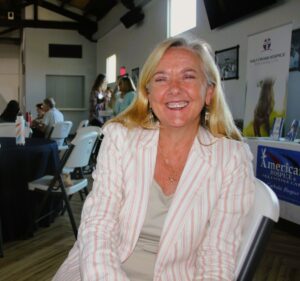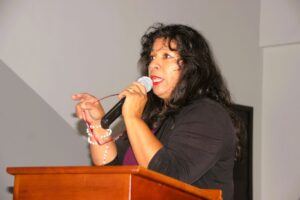
PHOENIX — In its effort to protect life inside the womb, the pro-life community faces not only abortion backers, but are working against a second foe, one veteran women’s health care provider told a conference on life at a Diocesan parish this past weekend.
“There is so much misinformation out there,” said Dr. Ingrid Skop, an obstetrician and gynecologist who has spent more than 30 years in private practice.

The public isn’t getting the facts to make an intelligent decision, Skop asserted while preparing to discuss “medical myths” about abortion to more than 50 lay women and men at St. Gregory Parish’s The Truth Set Us Free conference Saturday.
She cited one example.
“There is a lack of data, particularly about abortion drugs,” she said.
A health care provider who has delivered more than 5,000 babies and personally cared for many women who have been physically or emotionally harmed by abortion, Dr. Skop pointed to several other areas where the gap between fiction and reality is clouding the discussion:
* what women experience;
* how developmental abnormalities are successfully treated;
* survival rates for “life-limiting” fetal conditions;
* safety, and
* survival rates of “aborted” babies.
AN INCOMPLETE PICTURE
A Catholic, and a fellow of the American Congress of Obstetricians and Gynecologists (ACOG), as well as a married mother of three children with her physician husband, Dr. Skop said mainstream media and abortion supporters often paint an incomplete or misleading picture.
A board member and medical director for pregnancy resource centers in San Antonio, Austin and Houston, Texas, Skop is vice president and director of medical affairs for Lozier Institute, a national, private pro-life research and education body based in Arlington, Va.
She and her colleagues use science-driven data and studies to advise legislators, policymakers and the media on a broad spectrum of topics, including abortion, women’s health, prenatal diagnosis and treatment for the unborn, perinatal hospice, stem-cell research, health care policy, “and much more,” according to Lozier’s website.
The institute’s research was cited in 17 amicus curea or “friend of the court” briefs filed in the Dobbs v. Jackson, the United States Supreme Court case that overturned the 1973 Roe v. Wade ruling legalizing abortion at the federal level.
Organized by the Diocese of Phoenix’s Office of Respect Life Ministries and the Respect Life Ministry at St. Gregory, the conference featured Skop as its keynote.
Other speakers included diocesan Respect Life Office manager Marina Salvador-Velazquez; Susan B. Anthony Pro-Life America Arizona State Director Marilyn Birnbaum; and Rosie Villegas-Smith, founder of Voces Unidas.
AMERICAN PUBLIC ‘GASLIGHTED’
Dr. Skop said abortion advocates and the mainstream media are main drivers of the information gap.
“The American public has been gaslighted for 50 years,” she said, referencing the time the nation was guided by Roe v. Wade. When the court struck that decision down nearly 2 years ago, it concluded there is no federal constitutional right to abortion, leaving it to individual states to decide the issue.
Arizona recently drew the national spotlight with the state Supreme Court’s April 9 decision to uphold a near-total ban.
That ruling kept in place a pre-Roe law outlawing the procedure in all cases, including rape and incest, unless it preserves the life of the woman.
That law supersedes a 2022 edict allowing abortion thru the first 15 weeks of pregnancy.
However, a pro-abortion organization is working to have placed before voters this November a measure that would be enshrined in the state constitution, permanently allowing abortions without restriction.
Arizona Catholic Conference, the public policy agency for the Diocese of Gallup, the Diocese of Phoenix, the Diocese of Tucson and the Holy Protection of Mary Byzantine Catholic Eparchy of Phoenix, issued a Feb. 2 statement, urging the public against signing the ballot petition.
Should the initiative pass, “our own Arizona Legislators could lose the ability to regulate abortion in any way, leaving us with the potential for fully unrestricted abortion,” the bishops stated, adding, “(the proposal’s) vague language would make Arizona one of the most extreme states in terms of abortion.”
READ the full statement here: https://azcatholicconference.org/featured/do-not-sign-abortion-campaign-in-arizona/
READ the ballot proposal for A.R.S. 19-111 here: https://apps.arizona.vote/electioninfo/assets/47/0/BallotMeasures/I-05-2024%20Arizona%20for%20Abortion%20Access.pdf
READ the bishops of the Arizona Catholic Conference statement on the Ariz. Supreme Court abortion opinion here: https://azcatholicconference.org/colums-and-statements/bishops-of-the-arizona-catholic-conference-statement-on-az-supreme-court-abortion-opinion/
“You have a stark choice in Arizona,” noted Dr. Skop, cautioning on unrestricted procedures without safety standards. “Some really bad behavior happens when nobody is supervising abortions,” she said.
With limits, she explained, there are fewer abortions as well as a tendency away from behavior that leads women where they find themselves having to consider ending a pregnancy.
“People who have promiscuous sexual activity either stop or do things to prevent pregnancy,” she said. “We’re going to have fewer unwanted pregnancies because people modify their behavior.”
This is dramatically at odds with pro-abortionists, who say that women should have the right to choose what to do with their bodies – from sexual activity to ending a pregnancy.
Such a choice, however, ignores reality, Skop argues.
“Abortion harms women — emotionally, psychologically. There is six times the risk of suicide in the year following an abortion.”
Physical complications are more common than what the public is told, she asserted.
U.S. DATA FLAWS
The doctor cited other misinformation.
“Complications and deaths are much, much higher than U.S. data indicate. Most of our data come from abortion-industry researchers,” she noted. In Europe, where most countries fund abortions through a single-payer health care system, the issue is far less politicized, so the data is more reliable, she explained.
Her organization, Lozier, said U.S. data is growing worse.
With no comprehensive, universal repository, the Centers for Disease Control relies on state-level numbers. But reporting isn’t mandatory, and some states don’t participate.
These include California, believed to have the nation’s highest volume of abortions.
Activists often rely on data from entities such as Guttmacher Institute, which describes itself as opposing gestational limits “at any stage in pregnancy.”
PILL USAGE
One thing is clear: Pill usage is up significantly since the Dobbs ruling.
Skop said abortion drugs are “very dangerous.”
The Food and Drug Administration has “essentially removed all safeguards” on drugs, she said.
These pills, ordered online and delivered by mail, often come not from a doctor treating a woman but an online abortion pill service such as AidAccess.
“I’m caring for more women harmed by abortion drugs now than I did prior to Dobbs because there’s no doctor involved,” Skop said. “A lot of states have enacted laws protecting out-of-state doctors who prescribe drugs that harm a woman. There is no ultrasound, no pre-abortion test — no one knows who’s ordering these drugs. A lot of them are coming from international manufacturers.”
Other conference speakers pointed to misinformation.
Voces Unidas founder Rosie Villegas-Smith, whose organization advocates for the unborn as well as migrant families, said that women migrants — after arriving in the U.S. — are often approached by groups such as Planned Parenthood. Villegas-Smith said that one woman told her she underwent an abortion without any prenatal counseling.

“They go after minority women who don’t have enough information. They’re preying on them. This is racist,” Villegas-Smith said.
“Don’t say this is an abortion — it’s a victim. This is a baby,” she continued, displaying a photograph of a fetus at 10 weeks, with clearly developing head, torso, hands, and feet.
Skop echoed the point.
“From a human-rights perspective, it’s scientifically undeniable that the unborn human is a living genetically distinct human. He has totally different genetics than his mother. He’s in her body, he’s not part of her body.”
SOCIAL RESPONSIBILITY
Skop said it’s incumbent upon the public to do its homework.
Many OB-GYNs fear speaking, she added.
Skop said that 2 years ago, the American Board of Obstetrics and Gynecology (ABOG) — notified providers they could lose their board certification if they spread misinformation about “essential reproductive health care.”
“That has a chilling effect, particularly on younger obstetricians,” she said.
Attendees said the conference gave them valuable insight.
“It’s just so overwhelming — this whole issue,” said Jeri Spencer, a parishioner of St. Henry in Buckeye.
A close family member had been raped and used an abortion pill afterward, unaware of the numerous Church resources, Spencer explained.
“People need to know how much help and encouragement there is from our Church,’ she said.
“It’s always been a struggle to talk to people about life, especially in cases of rape and abortion, and for those who don’t believe in God (for) them to understand every life is precious,” said Mary Ellen Candra, a parishioner at Our Lady of Joy in Carefree.
Candra was particularly struck by the advice of one speaker.
Maria Birnbaum, the Arizona state director for Susan B. Anthony Pro-Life America, told the conference that compassion is pivotal in changing hearts and minds of abortion supporters.
“Assume first that (they’re) a good person; that they have a good and compassionate heart, and that it’s possible in our world to be trapped in a bubble of lies, and that stream (of lies) sounds so good, because the Devil is so good about making something so horrific feel so good and loving and compassionate,” she said.
Later, Birnbaum urged those in the pews to educate themselves and engage.
“A lot of people make this mistake of thinking the bishop or a pastor can just say this one thing and everybody in the Catholic Church all of a sudden will not want to have an abortion. It’s still the duty of every single person in every pew to reach out,” she said.
“This is the fight of our lives.”





